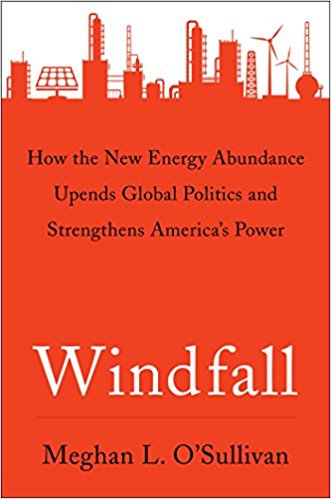You have /5 articles left.
Sign up for a free account or log in.
 Windfall: How the New Energy Abundance Upends Global Politics and Strengthens America’s Power by Meghan L. O’Sullivan
Windfall: How the New Energy Abundance Upends Global Politics and Strengthens America’s Power by Meghan L. O’Sullivan
Published in September of 2017.
The change that we seem to talk about least in higher education is perhaps the most important. That is the transition from scarce to abundant energy. Perhaps Meghan O’Sullivan’s excellent new book, Windfall: How the New Energy Abundance Upends Global Politics and Strengthens America’s Power, will spur some campus conversations.
O’Sullivan, a professor at Harvard’s Kennedy School and former State Department official, describes the geopolitical consequences of America’s shale energy boom. The exploitation of tight oil and gas through fracking has dramatically increased the supply of energy. The U.S., while still a large importer of crude oil, has become the world’s largest producer of natural gas. The result of fracked oil and gas has been both lower gasoline prices, and a shift from coal to natural gas as the primary fuel for electricity production.
Energy is a thread that runs through every academic discipline. Campus conversations that we should be having include the environmental benefits and risks of fracking, the merits of large-scale public investments in renewable energy, and the advantages and costs of enacting policies designed to promote U.S. energy independence.
On energy independence, O’Sullivan is skeptical that the U.S. should attempt to produce more energy than it consumes. She argues that a better policy would be promote Continental American energy independence, with Mexico and Canada and the U.S. forming a single production and consumption unit.
My guess is that many in our IHE community will not be big fans of oil and gas fracking. Am I right?
O’Sullivan makes a persuasive case that the geopolitical benefits of high levels of energy production are enormous. The ability of the United States spend less of its GDP on energy imports, and to dampen the possibilities of energy shortages, is a key driver of American economic strength. Increasing the supply of energy in world markets reduces the power of energy producers, such as Russia and Saudi Arabia, while elevating the position of importers such as China.
Reading Windfall made me question if my concerns about the impact of fracking on local communities and the environment should be balanced with an appreciation of the benefits of increased U.S. energy production.
How many books do you read that make you question your own thinking?
Energy production and consumption is one important lens that helps us understand our world. Windfall is one of those indispensable books that can help us understand the relationship between energy, economics, and geopolitics.
What other books on energy would you recommend? I’d like to learn more.
Some of the books on energy that I’ve read and would recommend include:
- Everything by Daniel Yergin, including The Commanding Heights, The Prize, and The Quest. They are all fantastic.
- The Boom: How Fracking Ignited the American Energy Revolution and Changed the World by Russell Gold
- The Grid: The Fraying Wires Between Americans and Our Energy Future by Gretchen Bakke
- Smaller Faster Lighter Denser Cheaper: How Innovation Keeps Proving the Catastrophists Wrong by Robert Bryce
- The Powerhouse: Inside the Invention of a Battery to Save the World by Steve Levine
What are you reading?




